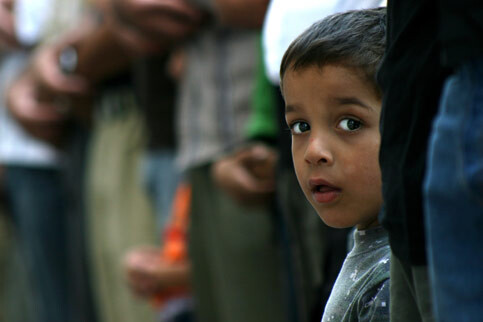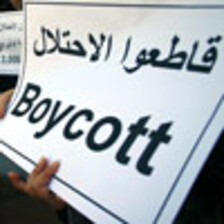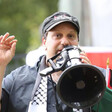The Electronic Intifada 14 September 2007

A young Palestinian participates in noon prayers organized by Mahmoud Abbas’ Fatah party in the West Bank city of Bethlehem. Around the West Bank Fatah organized prayers to show its support of Fatah in the Gaza Strip in opposition to Hamas, 7 September 2007. (Luay Sababa/MaanImages)
In the past few months, Palestinians in the Diaspora have watched with horror the latest developments in their homeland. There has been a flurry of articles about what to do, but overall there is a feeling that they are helpless to affect the situation on the ground. What has been missing is an understanding that Palestinians in the Diaspora must undertake a clear assessment of their own situation if they are to have any impact at all.
The recent events have cast light on dark deeds: the collaboration between Mahmoud Abbas and associates like Mohammed Dahlan on the one hand, and Israel on the other; the transfer of weapons and training by the US and other countries to certain Palestinian militias whose mission was to overthrow the result of the January 2006 election. Palestinians see clearly that Abbas — who embraces Israeli leaders while refusing to talk to other Palestinian factions — was the author of the Oslo agreement that never even mentioned the word “occupation,” and is now discussing a new “agreement of principles” that will cancel the right of return, legitimize Israeli settlements and threaten other basic rights. In short, what we have now is a clique of collaborators in control of Fatah and the Palestinian Authority “presidency” and much of what is left of the PLO.
In the Western Diaspora — Canada, the United States and Europe — in the past ten years, by contrast, Palestinians have undergone something of a revival. There has been growth in numbers, institutions and activities. For the most part this has been dependent on young people. For example, students’ networks like Solidarity for Palestinian Human Rights (SPHR) in Canada and the Palestinian Solidarity Committee (PSC) in the US along with Al-Awda are all overwhelmingly composed of people under 35 years old. These networks came to existence after the collapse of Palestinian institutions in the Diaspora following the signing of the Oslo Accords in 1993. At that time PLO institutions were sidelined by the Oslo leadership in exchange for the creation of the Palestinian Authority (only to be resurrected recently as a rubber stamp for Abbas’ collaboration with Israel last month), effectively leaving the Diaspora disenfranchised.
Many long-established local Palestinian groups, particularly those associated with the dominant factions, were not able to adapt to the new realities. They failed to provide the basic services, assistance and representation any immigrant community center must provide to its constituency. But they also let the community down politically, failing to take strong public positions challenging the flaws of Oslo, or engaging in effective organizing. This led to a decline in membership in many community centers, dropping from the thousands to mere dozens.
In the absence of alternative structures for representation, and with the emergence of the Internet, groups like SPHR and Al-Awda among others, and independent media like The Electronic Intifada started popping up across North America in the mid-1990s and early 2000s. After the second intifada broke out, they became the most visible and vocal forces standing up to Israeli and Zionist propaganda, providing a mechanism for young Palestinians in the Diaspora to talk to each other and organize. Thus, they also provided an invaluable service to the community: self-education and celebration. Zionist institutions grudgingly credited these projects with challenging the monopoly they had held on the western media narrative, making it harder to pass pro-Israeli propaganda without a response from an increasing number of articulate individuals.
Of course these successes were not without hardships. There were the dark times after 2001 as pro-Israel groups launched their weight against the most visible advocates of Palestinian rights. In Canada, student activists were targeted with expulsions and criminal charges and in the United States professors who were deemed too outspoken were the focus of intense campaigns of vilification and intimidation. At the same time, US authorities tried to send a message with politically-motivated prosecutions against individuals like Professor Sami al-Arian. Despite all these efforts, the community as a whole has not been frightened.
The battle that has gotten less attention has been the one within the community. The self-proclaimed community leaders and associations of the old guard largely avoided publicly supporting many of those on the front lines or even worked clandestinely to undermine them. In some cases it was the innocent warnings from frightened parents to their children, “don’t join SPHR!” In others it was the attempts to hold “dialogue” groups, presenting the “civilized” Arab as an alternative. For instance right after the “Concordia Uprising” in 2002 when Benjamin Netanyahu was denied his right to spread hate speech, the Concordia Administration held a panel discussion with a few Zionist and Arab individuals. One of the tokens said “We can be civilized; see, we can agree to disagree!”
Yet these obstacles were never more than minor distractions to the Palestinian movement in the west, until the movement really started to take off. The lightning rods targeted by Zionist organizations survived. This only encouraged more people to be involved, and emboldened them. Along with all the remarkable achievements of the movement within the student and labor unions and the anti-war movement, this created an unprecedented amount of maneuvering space for Palestinians. And here is where the problems started. Suddenly, all those “liberal” and “civilized” individuals understood that the train was leaving without them. Having failed to stop the movement, some are desperately trying to regain legitimacy in order to take control of this new space.
In the US and Canada there have been calls for national meetings to formulate umbrella organizations that would speak on behalf of all Palestinians living there. But why now, and who is involved? Two things need to be pointed out before we answer these questions. First, for the most part the front line organizations like SPHR and Al-Awda are defined as “solidarity groups” although they are founded and led by Palestinians and even the majority of their membership is Palestinian. Second, these groups are not affiliated with any of the “old country” feuds or factions because their membership is mostly young and never belonged to these factions. This is relevant because some actors have insisted that these incipient national organizations be centered on these old and largely irrelevant factional identities. Others are insisting that only Palestinians be allowed to participate, which opened the discussion of who is a Palestinian. These issues are being purposefully exaggerated in order to exclude solidarity groups and/or give more voting power for failed “community groups.” The constant talk of blood quantum (“only your mother is Palestinian!”) is also designed as psychological pressure against the young students to make it uncomfortable to be in those meetings.
Why is all this happening now? When the day comes for Abbas to sign on the line — giving up Palestinian rights — he needs a Diaspora leadership that is in line with his decisions. In Canada, almost all Palestinian advocacy and community groups have been involved in these efforts, but our tried, tested and failed “elite” are trying very hard to take the helm once again — if not by democracy then by any means necessary. Since these discussions started last year, some of the steadfast individuals have received physical threats and even death threats. And things have not got serious yet.
In the past two years in Europe, Palestinians were able to form an umbrella group that actually challenged the Abbas line, and tried to challenge the ban on the elected Hamas government. It may be no coincidence that now the old “elite” in Canada are receiving backing from Abbas and his entourage. Since last year there has been a rash of Fatah visits to Canada and the US where the primary goal is meeting with prospective allies here to prepare them for seats in a revived (but Abbas controlled) PLO. In recent months, Fatah has sent senior representatives to rally the support of Palestinians in Canada late last year and this summer following the events in Gaza and promised rewards to potential allies.
Palestinians in the Diaspora need to learn the lesson from Gaza and Lebanon. Although all Palestinians desire unity, it is impossible with those who are actively collaborating with the Israeli agenda and seeking to undermine the Palestinian movement for liberation. We cannot allow those who hijacked Palestinian institutions in Palestine in order to serve Israel to do the same in the Diaspora.
Many have argued that we need to revive and democratize the PLO, but the question is how. It is clear that those who still control the PLO structures will never willingly allow this to happen. There must be grassroots pressure to bring that about. If the PLO is not open to democratization, we should call for national and international conferences for all Palestinian communities to form a new democratic organization that represents all sections of our society. It will be an enormous challenge, but it is one we have to meet to make clear there is no mandate and no possibility for Abbas, or any other would-be collaborator, to sign away Palestinian rights. Judging from the emerging agenda of the US-planned “peace conference” in November, it may be now or never for us to act.
Laith Marouf is the Chapter Coordinator of SPHR, the largest network of students working on Palestinian human rights in North America. He can be reached at laith@sphr.org or visit www.sphr.org for more information.


